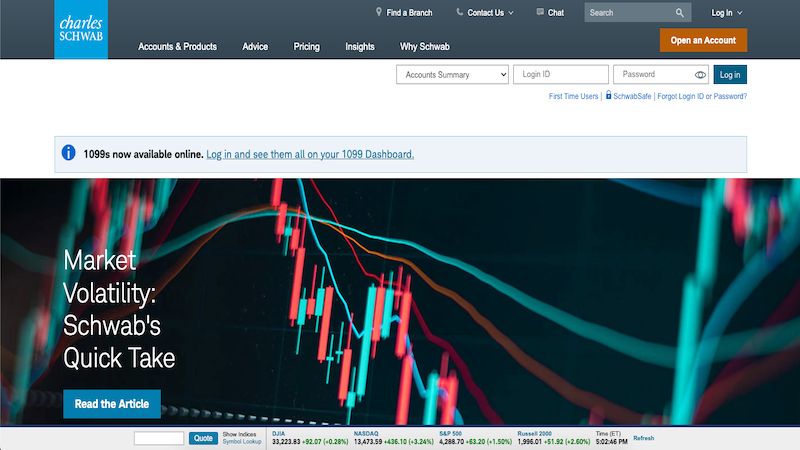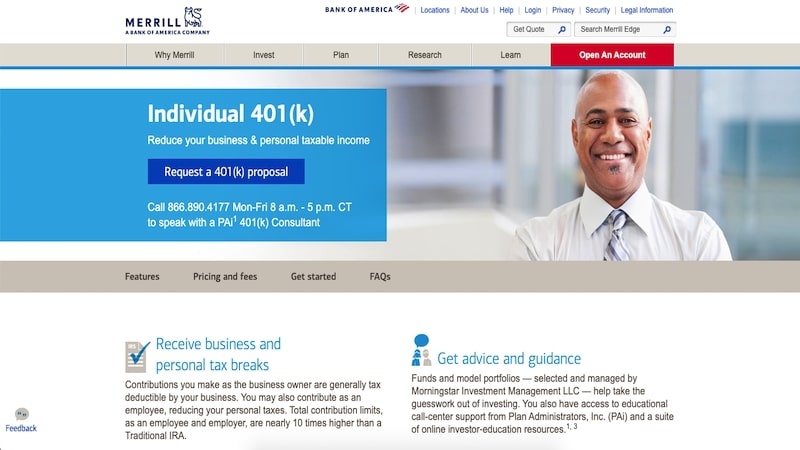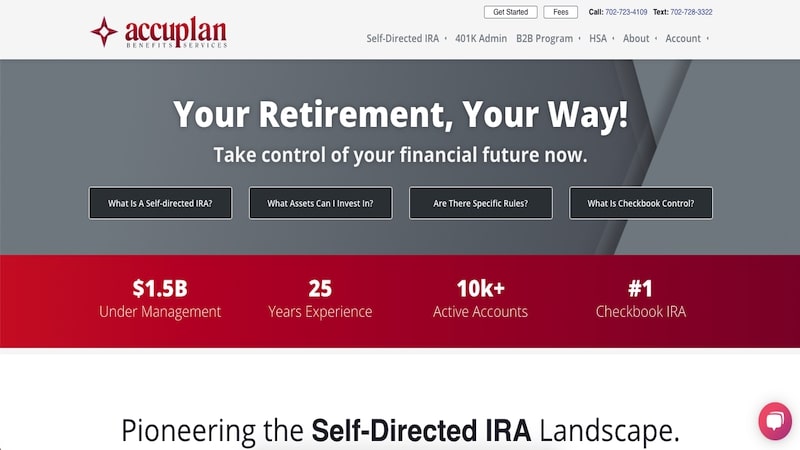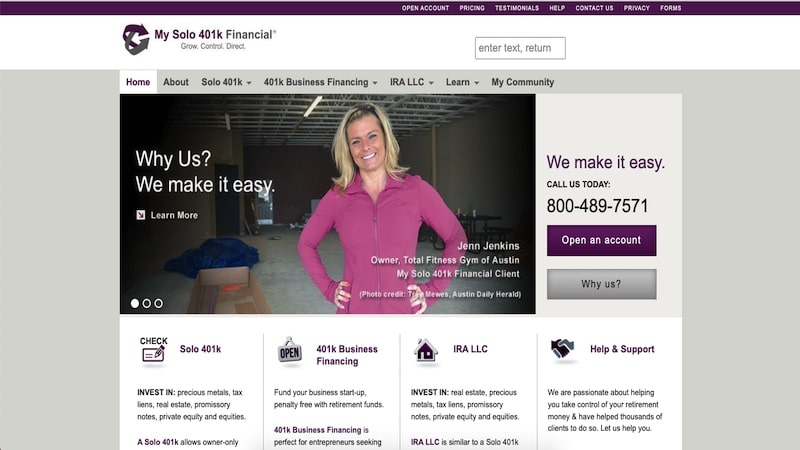9 Best Solo 401k Options
Some products in this article are from our partners. Read our Advertiser Discloser.
Reviewed by: Roger Wohlner, Investing Editor
One of the perks of working for a company full-time is that you may have access to a 401k plan to help prepare for retirement. These plans allow you to contribute money to an account and invest to build wealth.
All the money you put in is deducted from your taxable income. Some employers match contributions up to a specific percentage.
Certain plans may also offer a Roth 401k option for contributions made on an after-tax basis. This creates the opportunity to withdraw your savings tax-free in retirement.
If you are self-employed, you may believe you don’t have access to a 401k. That’s not true!
Many discount brokerages offer special “solo 401k” plans for small business owners and their family members. Solo 401k plans are often referred to as “one participant” or “individual” 401k plans.
Let’s examine the details of a solo 401k and a few companies that offer them. You can then decide if this plan makes sense for you.
What is a Solo 401k?
A solo 401k is a retirement plan designed for people who work for themselves. If you run a small business with no employees, you can qualify for a solo 401k.
Your spouse can qualify if he or she is involved in the business. A fellow business partner who is an owner is also eligible.
The key is that no common-law employees are eligible to participate. A solo 401k is not the right option for your business if you have employees that you want covered by a retirement plan.
This retirement plan can be a powerful tool in your savings efforts. It allows you to invest in just about anything. Investment options include stocks, mutual funds, bonds and exchange-traded funds.
Keep in mind there are some prohibited investments. Consult with your 401k custodian firm for more information.
Contributions to a solo 401k can be made on a pre-tax basis to a traditional account. They can also be made on an after-tax basis to a Roth account if your custodian offers this option.
Just like employer 401k plans, you typically can’t withdraw money in a solo 401k until age 59 ½. Taking money out before then means you may pay taxes on those funds in addition to a 10% penalty.
Major Brokerage Solo 401ks
Many major online brokerage firms offer a 401k option for self-employed people. Most plans are similar but may have different costs, options or features.
It’s worth researching all of these companies to see which one offers a solo 401k that is a good fit for you.
Most major discount brokerage firms will set up a solo 401k at little to no cost. It’s important to note that they may charge commissions each time you trade a bond, stock, mutual fund or other investment.
Therefore, it would be wise to avoid making frequent small, purchases. Make larger trades spread out over an extended period instead.
1. Fidelity

With $8.8 trillion total customer assets under management, Fidelity is one of the world’s largest discount brokerage firms. It offers a Self-Employed 401k with access to a wide range of investment options.
This account has no minimum balance requirements and $0 commissions for online ETF, U.S. stock and options trades.
Free one-on-one investment advice is available via phone or in person at one of its many investment centers.
You can contribute the maximum of $19,500 per year to a Fidelity Self-Employed 401k as the employee. As the employer, you can contribute up to 25% of compensation (up to $57,000.)
Fidelity does not offer a Roth 401k option where contributions can grow tax-free.
One commenter on Fidelity’s website noted this lack of a Roth option as a major drawback.
“I’m strongly considering switching if Fidelity doesn’t roll out the Roth feature soon,” they wrote. “I’ve been otherwise very pleased with Fidelity’s offerings and services.”
Pros: Large investment selection, low fees
Cons: No Roth option.
2. TD Ameritrade

TD Ameritrade is another prominent discount broker offering a solo 401k with a broad spectrum of investment options from which to choose.
Employee contributions top out at $19,500 with employer contributions up to $57,000 or 25% of compensation.
There are no maintenance or commission fees for online trades on the TD Ameritrade Solo 401k account. Expect to pay a $.65 fee for options trades and a $6.95 commission for any stocks not on a U.S. exchange.
TD Ameritrade allows you to make loans from your Solo 401k account. Additionally, there is a Roth option. Read our full TD Ameritrade review for all the details.
Pros: No maintenance fees, many investment options, Roth option available.
Cons: $0 commission fees only apply to U.S. exchange-listed ETFs, options, and stocks.
3. Charles Schwab

Schwab is one of the oldest discount brokerages with some of the lowest costs. The company offers an individual 401k with no maintenance fees or trade commissions.
With Schwab, you can invest in a wide range of stocks, bonds, mutual funds and ETFs.
You can contribute up to 20% of profit sharing on top of the $19,500 salary deferral max. All contributions can’t exceed more than $57,000, per the IRS limit.
Taking loans from a Schwab Individual 401k is not permitted. Furthermore, Schwab does not offer a Roth 401k option.
Pros: Large selection of investments, and Schwab ETFs and more than 500 others trade with no commission. Schwab also offers one-on-one investment help at no charge.
Cons: Loans are not permitted. No Roth 401k option.
4. E-Trade

E-Trade is synonymous with online investing and was named the #1 online broker by Kiplinger. The company offers a 401k for self-employed people with access to a wide universe of investments.
The brokerage firm has a traditional and Roth solo 401k option. It’s possible to split contributions between the two.
You can trade stocks and ETFs for $0. Options cost 50 to 60 cents. Mutual funds with a transaction fee are $19.99 per trade.
You can hand over management of your solo 401k to E-Trade Capital Management. They offer various portfolios to fit your needs.
The smallest portfolio requires at least a $25,000 minimum investment with a 0.65%-90% blended annual advisory fee.
E-Trade allows contributions of up to 100% of compensation or $57,000 annually, whichever is less.
Unlike some brokerages, you are permitted to make loans from an E-Trade solo 401k plan.
Pros: Large investment selection. Roth 401k option available. Ability to make loans.
Cons: High cost of $19.99 to trade mutual funds.
5. Vanguard Solo 401k

Vanguard is a pioneer in low-cost investing. They offer an individual 401k option for small business owners and their spouses.
Investment choices are limited to about 100 Vanguard mutual funds, including 38 index funds with low expense ratios.
Fees include a $20 per year charge for each account. You won’t pay commissions on each investment purchase.
The company offers a Roth option. Loans from an individual 401k are not allowed.
Pros: Low costs. Roth option available.
Cons: Investment choices limited to Vanguard funds. No loans allowed.
6. Merrill Edge Individual 401k

Merrill Edge is a Bank of America subsidiary offering an individual 401k.
Fees include $100 for setup and a monthly fee of $20 for businesses with plan assets under $250,000. For businesses above that threshold, the monthly fee is $25.
Merrill Edge allows for loans and has a Roth 401k option. The provider lets you invest in mutual funds or model portfolios from Morningstar Investment Management.
| Broker | Commission/Fee | Loans Allowed? | Roth Option? |
| Fidelity | $0 per trade | No | No |
| TD Ameritrade | $0 per online trade, $.65 for options trades, $6.95 for non U.S. exchange stocks | Yes | Yes |
| Charles Schwab | $0 per trade | No | No |
| E-Trade | $0 for stocks and ETFs, $19.99 for mutual funds | Yes | Yes |
| Vanguard | $0 to $20 per trade, depending on investment. $20 per year account fee. | No | Yes |
| Merrill Edge | $100 setup fee, $20-$25 per month maintenance. | Yes | Yes |
Self-Directed 401k Options
If you want to set up a solo 401k but prefer not to use a major discount brokerage firm, you can go through a company offering a self-directed plan.
These companies essentially allow you to serve as the custodian and recipient of the 401k plan.
Self-directed plans may be worth exploring if you want access to some non-traditional investments. These may include private debt and equity, early-stage venture capital or precious metals.
Here are a few of the more prominent options in this space:
7. Rocket Dollar

Rocket Dollar lets you have a self-directed solo 401k plan with the ability to invest in almost anything permitted by the IRS. Expect to pay a $360 upfront account setup fee and then $15 per month after that.
Rocket Dollar offers access to a wide range of asset classes through a variety of partnerships with investment groups. They include:
Real estate
- The DeRosa Group
- Quinlan MacKay
- Aerial Investment Management
- Pinnacle Storage Properties
- SDIRA Wealth
- Rich Uncles
- BCP Services
Early-stage investing
- WealthBlock
- Dealbox
- Honeycomb Credit
- Mr. Crowd
- KingsCrowd
- 1000 Angels
Physical assets
- Energy Funders
- Harvest Returns
- US Gold Bureau
Private Equity and Debt
- Cadence
- Carofin
- DarcMatter
8. Accuplan

Accuplan Benefits Services offers a self-directed solo 401k plan with access to real estate investments. Using their one.k plan, you can purchase real estate directly, buy options on properties and even flip properties.
To facilitate this, Accuplan will establish LLCs or C-Corps for you and set up the 401k plans for those companies. Under this setup, you direct the company’s investments as a trustee.
9. MySolo401kFinancial

MySolo401k offers self-directed plans for small business owners. They allow you to invest in real estate, precious metals, tax liens, promissory notes and private equity. You can even invest in Bitcoin through MySolo401k.
Beyond that, MySolo401k will let you invest in stocks and mutual funds since it will help you set up a brokerage account through one of the discount brokerages above.
The initial setup fee is $550, then you’ll pay a $125 annual fee after 12 months.
A solo Roth 401k option is available and you can take out loans on the account.
Other Things to Know
Be sure to keep these other things in mind as well.
Contribution Limits
There are annual limits to the amount of money you can contribute to your solo 401k. For example, in 2023, an individual could put aside a maximum of $66,000. Anyone over the age of 50 could contribute an additional $7,500 in catch up contributions.
When you make these contributions, you make them as both an employee and an employer.
“The business owner wears two hats in a 401(k) plan: employee and employer,” the Internal Revenue Service notes. “Contributions can be made to the plan in both capacities. The owner can contribute both.”
If you have a solo 401k plan, you can contribute up to $19,500 in “elective deferrals,” up to a maximum of $66,000 including profit-sharing contributions. These contributions are made by the employer.
Thus, if you contribute the maximum in elective deferrals, you can contribute no more than $37,500 in profit-sharing. Got it?
For those who are 50 or over at any point during the year, the maximum elective deferral is $30,000 in 2023. This includes a $7,500 catch-up contribution.
Profit-sharing contributions can’t exceed more than 25% of your employee compensation. This might be your salary if you draw a salary from the business or your income as a sole proprietor.
Depending on your earnings, your maximum allowable contribution may be lower than 25%.
Your contributions may also be limited by the broker of your 401k plan. We’ll offer some details on those possible restrictions later.
Tax Advantages
A solo 401k plan allows you to pay less in income taxes. All contributions to solo 401k plans are deducted from your taxable income for a non-Roth plan.
For example, let’s say you earn $100,000 and contribute $19,000 to your 401k. Only $81,000 of your income would be taxable.
In some cases, this may move you to a lower tax bracket. As a result, there’s a great incentive to contribute as much as possible.
Additionally, any profit-sharing contributions reduce the income of your business. Consequently, they are a deductible business expense.
With a traditional solo 401k, you are required to pay tax on any investment gains once you withdraw money at retirement age.
Deciding whether or not to open a traditional or Roth 401k depends on many factors. These can include your current income and tax bracket as well as your projected tax bracket and income in retirement.
Talking to a financial advisor may help determine the best plan for you.
Loans from a Solo 401k
One potential advantage of a solo 401k is that they often allow you to borrow from the account. This can be helpful in the event of an unexpected cost.
You are allowed to borrow up to $50,000 from a 401k or 50% of your balance, whichever is less. Loans must be paid back with interest within five years.
Interest rates can vary depending on the administrator. They are usually a percentage point or two higher than the prime rate. Currently, this rate is about 3.25%.
Not all brokers allow for solo 401k loans. Be sure to check the fine print when researching plans.
Taking out a loan from your 401k should only be done when it’s absolutely necessary. Whenever you take money from an account (even if you pay it back), you could reduce the amount you will accumulate over time.
Generally speaking, you’ll earn more in the long run if you leave the funds alone.
Tax Forms
If your solo 401k account reaches more than $250,000 in value, the IRS requires you to fill out a 5500-EZ form annually. The form asks for basic plan information, your contributions for the year and total assets.
Income Calculations
Small business owners may need to do more than calculate their income and profits to determine how much they can put into a solo 401k. This is especially true when figuring out the profit-sharing portion of your income.
Profit sharing is limited to 25% of the employee’s compensation. In cases where he/she draws a salary from the business, it is 25% of that W-2 compensation.
Thus, that percentage ends up being closer to 20% of sole proprietor income due to the quirks of the calculations of the schedule as it flows through the 1040.
Calculating this can be complex. The IRS has a calculator to help you determine how much you can contribute.
Differences from a SEP-IRA
If you work for yourself, you may already have opened a Simplified Employee Pension.
SEP-IRA and solo 401k plans are similar. They both allow contributions of up to $57,000 and usually allow you to invest in a wide range of products. However, a solo 401k may be a better option in some situations.
Here are a few of the key differences to be aware of:
- A SEP-IRA can have more than one participant.
- A SEP-IRA does not offer a catch-up contribution for those who are 50 or over.
- Employee deferral contributions are not allowed with a SEP-IRA.
What Happens if You Hire Employees?
A solo 401k is an appropriate plan for a person who works for himself or who has a spouse or business partner involved in the company. It is not suitable for a company with employees.
If you have a solo 401k and hire workers, you will be required to switch your solo 401k to a traditional 401k plan. Doing this can come with hefty administrative costs and rules.
You may want to explore a SEP-IRA if you think you’ll hire workers in the future. A SIMPLE IRA, which allows for employee contributions, is also an option.
Summary
If you are a small business owner with no employees, you can still take advantage of a 401k plan. In fact, the high contribution limits on solo 401k plans make it a potentially lucrative option for you as you plan for retirement.
It’s hard to recommend any single broker because all have their pros and cons. Some offer low costs but limited investment options. Others are more flexible but have higher fees.
The key to selecting a solo 401k provider is to evaluate your needs. Then you can choose the option that best fits your situation. If you are unhappy with one provider, you can roll the account over to a different company.
Speaking to a financial advisor may help if you are considering opening a solo 401k. They can give you guidance on which provider to select, how much to contribute, and what investment choices to make.


E-Trade now offers $0 commissions on most stock and ETF trades.
Did you fact check your one man shop statements? Can you point to where the IRS disallows solo 401ks for a company made up of only owners? Say an s corp with two shareholders. My understanding is this is allowed.